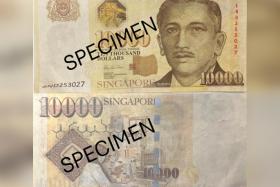Jail for former SingPost senior V-P for seeking $1m bribe, cheating to get higher pay
A former senior vice-president at Singapore Post (SingPost) misrepresented his employment history when he successfully applied for a job with the company in 2013.
As a result, Liang An Wey, who was dismissed in 2018, duped SingPost into giving him a higher pay than what he should have been offered – leading to $8,000 in excess salary in total.
Separately, Liang, 48, also attempted to obtain a $1 million bribe from mechanical and engineering firm Bintai Kindenko in 2015, in exchange for his recommending the mechanical and engineering firm for works at the SingPost Centre in Eunos Road.
He was sentenced to six months and a week in jail on Thursday after he was earlier convicted of one count each of cheating and an offence under the Prevention of Corruption Act.
District Judge Kow Keng Siong had earlier found him guilty of the offences after a trial.
On June 28, 2013, a recruiter from an employment agency submitted Liang’s curriculum vitae (CV) to SingPost, which was hiring for the position of V-P of project execution. On his CV, Liang stated that he had been employed as the head of project management at a construction firm called GSM Holdings since August 2012, drawing a salary of $12,500 a month, with an additional $2,000 allowance.
In January 2023, Deputy Public Prosecutor David Menon told the court that Liang was, in fact, not formally employed by GSM and was never a director there.
Instead, he had helped his friend Tan Yew Seng, who was a shareholder and director at GSM, on an ad hoc basis – primarily over a factory that GSM was then building in Senoko Loop.
DPP Menon had said: “(Mr Tan) made at least one verbal offer to pay the accused, but this agreement was never formalised. There was no contract of employment, the accused did not draw any salary from GSM, and GSM did not make any CPF (Central Provident Fund) contributions on the accused’s behalf.”
SingPost offered Liang the V-P position on July 12, 2013, and he received a letter of appointment as well as a form titled “application for appointment” that day.
Liang then endorsed the form, stating that he had been a director at GSM and had drawn a salary of $12,500 and $2,000 in allowance.
The DPP said that SingPost offered to pay Liang $15,000 per month.
During the trial, Mr Chan Kiat, SingPost’s then senior vice-president of group strategy and business development, testified that if he had known that Liang’s last drawn salary was $14,000, among other things, the company probably would have started negotiations at around $13,500 to $14,000.
Liang was represented by lawyers Eugene Thuraisingam, Johannes Hadi and Hilary Low, who stated that their client had not made any false representations.
However, the prosecutor said in his submissions: “The accused intentionally misled SingPost into believing he was formally employed and drawing a salary from GSM in order to obtain a higher salary from SingPost.”
As for the corruption charge, the prosecution said that he had tried to obtain a $1 million bribe from Mr Wong Siaw Fun who was a senior executive at Bintai Kindenko at the time.
DPP Menon said that Bintai Kindenko had been a proposed subcontractor of civil engineering and general contracting firm Shimizu Corporation for various tasks relating to the SingPost Centre project.
The DPP added: “Through a combination of deception, manipulation, and pressure tactics, the accused attempted to obtain a bribe of $1 million from (Mr Wong) in exchange for SingPost approving Shimizu’s nomination of Bintai.
“When this was unsuccessful, the accused abused his authority as a senior SingPost employee to have Bintai excluded from Shimizu’s bid.”
But according to the defence lawyers, Liang did not attempt to obtain a bribe from Mr Wong. The lawyers stated that it was instead Mr Wong who had offered Liang a bribe, which their client declined.
DPP Menon, however, said that Liang had attempted to obtain a bribe from Bintai because he expected that the company would be willing to pay one to secure a contract.
Get The New Paper on your phone with the free TNP app. Download from the Apple App Store or Google Play Store now


